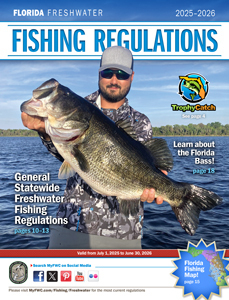
Welcome to 2025-26 Florida Freshwater Fishing

The Florida Bass Is Unique
By Chairman Rodney Barreto
Florida is known for doing things a little differently, and that includes our fisheries. From the winding waters of the Everglades to the vast expanse of Lake Okeechobee, our state is home to some of the most iconic and productive freshwater fisheries in the country. Now, we’re proud to add another distinction to that list: the Florida bass has officially been recognized as a unique species, separate from the largemouth bass found across the rest of the U.S.
This announcement confirms what anglers and biologists here have long known: Florida bass don’t just grow bigger, they’ve made Florida a bucket-list destination for freshwater anglers around the world.
While this recognition is new, Florida’s commitment to bass conservation and angler engagement is not. In 2010, the Florida Fish and Wildlife Conservation Commission launched the Black Bass Management Plan with a bold vision: to make Florida the undisputed Bass Fishing Capital of the World. That vision came to life in 2012 with the creation of TrophyCatch, a citizen-science program rewarding anglers for documenting their trophy-sized bass and contributing valuable data to conservation efforts. And in 2022, we doubled down with the Florida Trophy Bass Project to grow, study, and promote Florida’s biggest bass yet.
With the Florida bass now officially in a class of its own, our research and conservation work will be even more precise, and our passion for this legendary game fish even more focused. Best of all, nothing changes for you: your TrophyCatches, your next potential State Record, and your unforgettable days on the water are still just a cast away.
To dive deeper into this exciting development and celebrate what makes Florida fishing truly one of a kind, read a conservation article about the Florida Bass.

Freshwater Rule Changes
- Updated wording to include the new Florida bass species designation.
- Wakulla River: No person shall kill or possess Suwannee bass on the Wakulla River.
For the most up-to-date regulations, review the Florida Administrative Code where FWC rules are located under Chapter 68.

MyFWC.com
For the latest updates on fishing regulations, boating guidelines, and ways to support sustainable fisheries, visit the Florida Fish and Wildlife Conservation Commission’s fishing page.
FLRules.org
To stay up to date on the latest regulations, review the Florida Administrative Code’s FWC rules in Chapter 68.
Fish and Wildlife Alert Reward Program
To report violations related to fishing, boating, or hunting laws, you can contact the FWC by phone; on cell phones, dial *FWC or #FWC depending on service carrier; or submit a tip online through the Wildlife Alert system. You can also email your tip.
Stop the Spread of Nonnative Species
Introducing nonnative fish or other nonnative organisms into Florida’s waters is prohibited by law. To learn more about protecting Florida’s ecosystems, visit the FWC’s Wildlife Habitats page.
The Florida Fish and Wildlife Conservation Commission does not allow discrimination on the basis of race, color, sex, religion, national origin, age or disability. If you believe you have been discriminated against in any program, activity or facility of this agency which receives Federal financial assistance, you should contact/write to:
Florida Fish and Wildlife Conservation Commission, Office of Human Resources, 620 South Meridian Street, Tallahassee, FL 32399-1600; Telephone 850-488-6411
or contact/write to: Civil Rights Accessibility Coordinator for Public Access, U.S. Fish and Wildlife Service, Wildlife and Sport Fish Restoration Program, 5275 Leesburg Pike, Falls Church, VA 22041; Telephone 703-358-2349 or 703-358-2131.
Fishing Camps for Youth
The FWC is offering ways for today’s youth to reconnect with nature and the outdoors, through the Florida Youth Conservation Centers Network (FYCCN). This initiative is providing Fish Camps throughout the state.
Fish Camps, for youth of various ages and grades, combine teaching and practical application of angling and boating skills. FWC staff provide fish identification and anatomy lessons, and conduct a boating safety demonstration. The goal of Fish Camp is to establish individuals as lifelong anglers and stewards of aquatic and fisheries resources, so they can benefit from a healthy, active connection with nature. To locate a camp, or to help start a camp at a new location, email the team.
Fish Camps are fun and exciting for kids and what they learn will help them to live happier and healthier lives and become the Next Generation That Cares.


